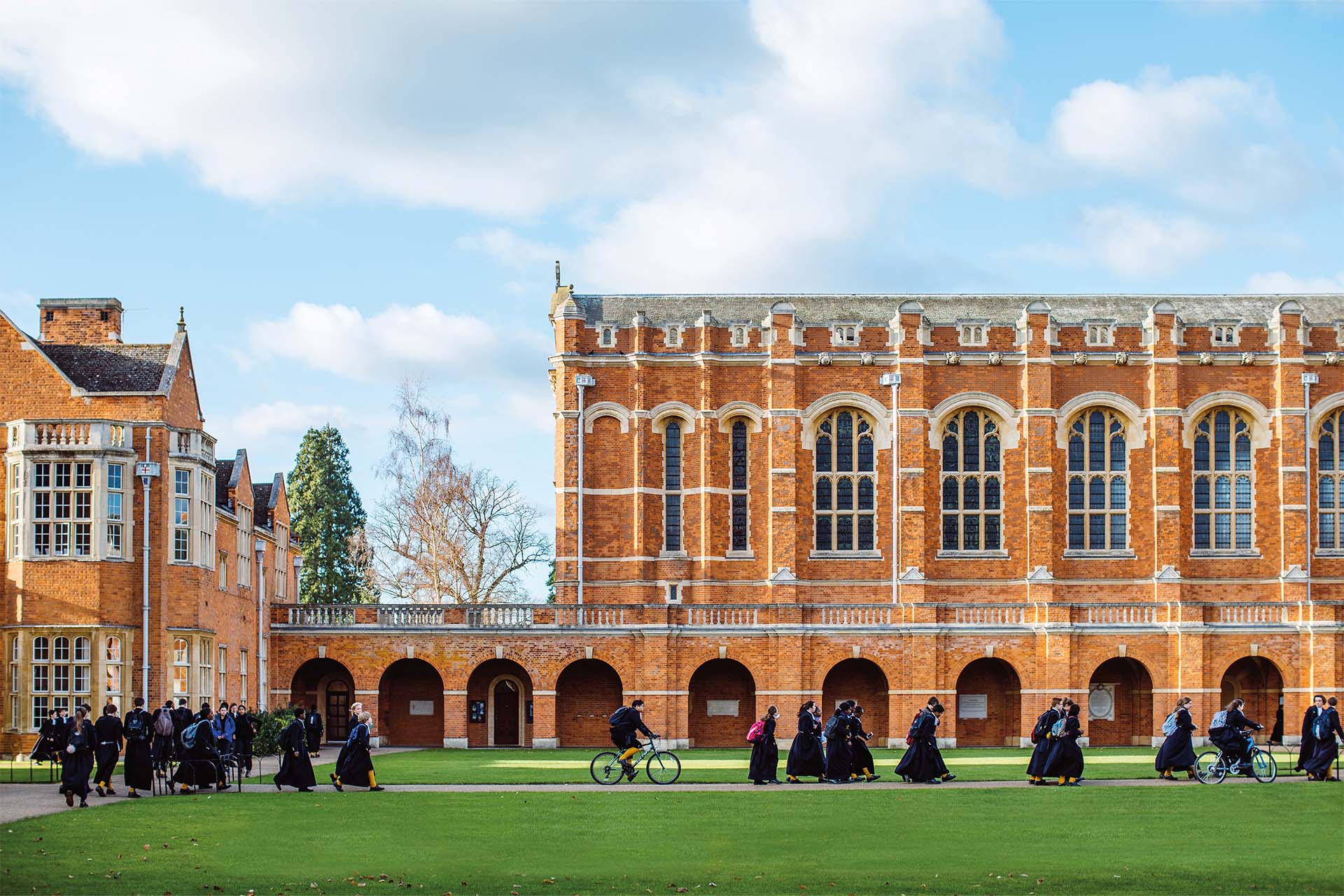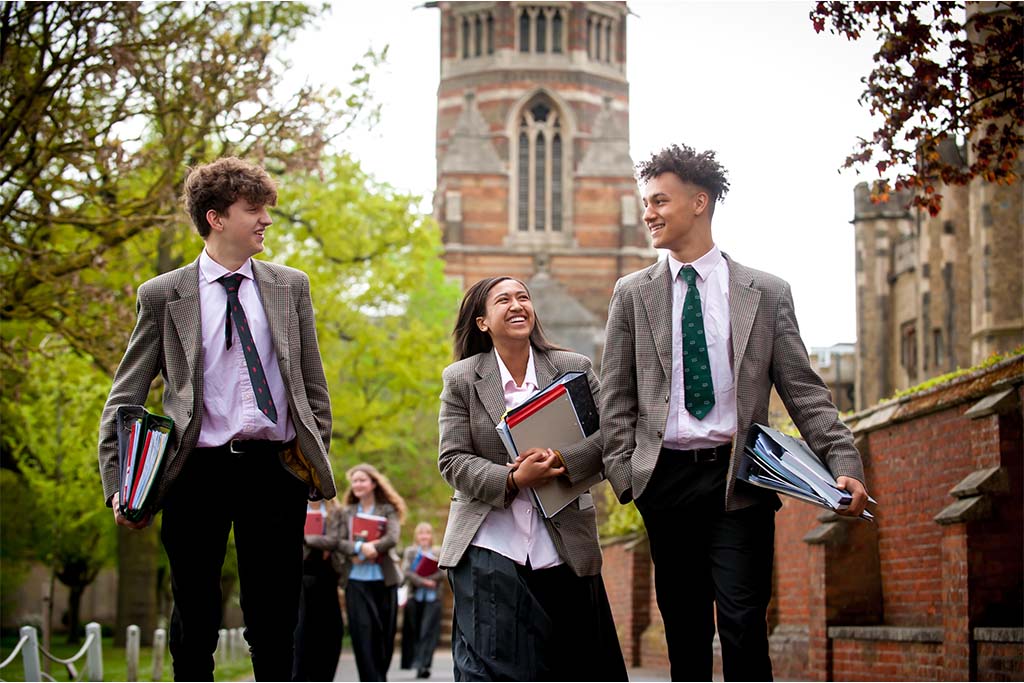
Back to the Future
By
3 years ago

Offering bursaries is a proud tradition dating back – in some schools – for centuries, finds Emma Reed

Demand for places at independent schools has increased over the past year, with many schools seeing a record number of applicants for senior entry in 2021/22. The pandemic starkly highlighted the disparities in educational provision and many parents fear being caught up in another cycle of uncertainty.
According to the Independent Schools Association, demand jumped by as much as 30 per cent in 2020 because parents of state-educated children feared their children had fallen behind during lockdown.
While demand is there, for many, the financial means are not. According to the 2021 Independent Schools Council Census and Annual Report, 35 per cent of all pupils currently receive help with fees. The total value of means-tested scholarships and bursaries amounted to £455m, an increase of 3.4 per cent on last year. For an extremely able child, a bursary could prove life-changing and schools with a long history of bursary provision appreciate their increasingly significant role for the future.
Indeed, the role of the bursary in education is rooted in the past. Christ’s Hospital (CH), founded in 1552, was one of the five Royal Hospitals of London created as a result of orders by King Edward VI to the Lord Mayor to appoint a committee of leading citizens to consider relief for the City’s homeless poor.
‘What strikes me about Christ’s Hospital is how true the school has stayed to its original purpose. No matter what race, class or ethnicity, we are all equal. The school has opened new doors of opportunity to me.’
Sam Odu, bursary recipient at Christ’s Hospital
CH took upon the education of destitute children from all backgrounds and ages. Today, it is the UK’s leading charitable school and the largest bursary charity. It provides 18 per cent of all 100+ per cent means-tested bursaries provided by independent schools in the UK. Currently, 11 per cent of pupils receive a fully supported boarding bursary place and 73 per cent receive some level of boarding bursary support.
Its links with its historic bursaries are strong. One of these is the Donation Governorship Scheme where individuals or organisations help a child enter the school by making a qualifying donation and presenting a pupil for admission. It relates back to a system of patronage that has been in place over the centuries since the early days of the school.
Although the school moved from its original site at the monastery of the Grey Friars in London to Sussex in 1902, traditions that continue today are a reminder of its charitable history such as the retention of the Tudor uniform and its annual parade through the City of London on St. Matthew’s Day and the Lord Mayor’s Show. Its band originated in 1868 when pupils asked for instruments to be bought to liven up their marching drills.
Sam Odu, 18, the beneficiary of a bursary who joined the school at 11, recalls the many opportunities he took advantage of, including his first time marching with the band. ‘What strikes me about CH is how true the school has stayed to its original purpose. No matter what race, class or ethnicity we are, we are all equal and given the same life-changing opportunities regardless of our family’s household income. CH has opened doors of opportunity to me that beforehand I never knew existed.’
Head, Simon Reid, is clear on the vital role of bursaries in the future. ‘As social and economic inequality continues to grow in the UK,’ Reid says, ‘it is vital that independent schools continue to engage as contributors to social mobility.’

James Priory, head of Tonbridge School, is conscious of its ‘charitable heart’. Founded by Sir Andrew Judde in 1553, to support about 50 scholars, it was entrusted to the Worshipful Company of Skinners after his death who still form part of its governing body.
‘It’s fair to say that vision is fulfilled today,’ says Priory. ‘Currently we support just under 50 pupils and from next year it will be 56. We have a significant anniversary coming up in 2028 when we will be 475 years old, and we have set ourselves the challenge of doubling the number of Foundation Award recipients by that time. The pandemic has thrown a sharp light on the kind of inequalities within education and opportunity. It feels all the more relevant for us, as a school, to be doing that.’
Priory himself was the recipient of an assisted school place. ‘I’m aware that I had an education that I otherwise would not have had,’ he explains, ‘and I feel appreciative of the impact it had on me.’ Going forward, Priory is conscious of the role of the school in offering practical support and advice to families who apply for a bursary. Once at the school, he sees how those pupils relish the opportunities available which, as they share their aspirations, has a ripple effect in the wider community.
The school still has on site something called ‘the common box’ dating back several hundred years with vestiges of the crests of the school and the Skinners’ Company still visible. This treasured, historic item was made to be a collection box where the scholars were all expected to pay a sixpence as a contribution to a common fund. Fines for missing a day of school could also be paid into it but, as Priory says, ‘the original principle was about collecting funds to enrich the education of everybody.’ Members of the Skinners’ Company still visit the school in their traditional robes and boys are invited to Skinners’ Hall, so the charitable origins of the school continue to play a key role today.
For the future, Priory is looking at current levels of support in place. It is key, he says, ‘to sustain it in a meaningful and successful way for the individuals who benefit and for the viability of the programme.’ The Royal Grammar School Guildford (RGS) was founded in 1509 as a ‘free schole’ for the benefit of bright local boys without means – and more than 500 years later, the school remains committed to this founding principle of providing an excellent education to local boys regardless of their background.
Currently, 68 boys there receive a bursary. Over three-quarters of those benefit from 50 per cent to 100 per cent fee support. The long-term ambition of headmaster, Dr Jon Cox, is for full merit-based open access where every student who earns his place, irrespective of financial circumstances, can become an RGS student.

Foundation Awards at Rugby School, a legacy of an original bequest left by Lawrence Sheriff, have been around since the school was established in 1567. Under the terms of this bequest, Rugby must have a minimum of 43 Foundationers at the school. Funds enabling this award come from rents from land in London left in Sheriff’s will, along with other bequests over the years.
In 2021/22, there will be 342 students who will benefit from the school’s various bursary provisions, 40 per cent of the student body. Of those, 136 will have between 50 per cent and 100 per cent of their fees paid. There are currently 45 students who benefit from 100+ per cent bursaries where all extras are paid in addition to fees and Rugby are very keen for families to come forward and apply.
While schools evolve and meet the challenges of the future, the past reminds them of their raison d’etre. Bursaries change the lives of others and enrich the school community itself. The purpose they serve is as indelible as the buildings that gave rise to them.
READ MORE FROM SCHOLARSHIPS AND BURSARIES 2021



